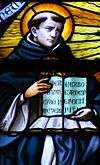Johann Baptist Metz
Johann Baptist Metz (born 5 August 1928) is a German Catholic theologian.[1] He is Ordinary Professor of Fundamental Theology, Emeritus, at Westphalian Wilhelms University in Münster, Germany.
Biography
As a teenager, Metz had been recruited in to the German military towards the end of World War II in 1944. Six months before the end of the war, he was captured by the Americans and sent to prisoner of war camps in Maryland and then Virginia. Following the war, he moved back to Germany and studied at the University of Innsbruck, producing dissertations on the philosophy of Martin Heidegger and the theology of Thomas Aquinas under the supervision of Karl Rahner. His experience in the war matches that of the German Calvinist theologian Jürgen Moltmann who would go on to write with Metz on political theology against a background of direct confrontation with Nazism.[2]
Theology
A student of Karl Rahner, he broke with Rahner's transcendental theology in a turn to a theology rooted in praxis. Metz is at the center of a school of political theology that strongly influenced Liberation Theology. He is one of the most influential post-Vatican II German theologians. His thought turns around fundamental attention to the suffering of others. The key categories of his theology are memory, solidarity, and narrative. Works in English include: The Emergent Church, Faith in History and Society, Poverty of Spirit, and Hope Against Hope. Collected articles can be found in A Passion for God: The Mystical-Political Dimension of Christianity, translated by Matthew Ashley and in John K. Downey, ed., Love's Strategy: The Political Theology of Johann Baptist Metz.
Fundamental to Metz's work is the concept of "dangerous memory," which relates to anamnesis in the Greek New Testament, a term which is central to the theology of the Eucharist. Metz speaks variously of "the dangerous memory of Jesus Christ," "the dangerous memory of freedom (in Jesus Christ)," the "dangerous memory of suffering," etc. One of the motivating factors for this category is Metz's determination, as a Christian theologian from Germany, to rework the whole of Christian theology from the ground up in light of the disruptive experience of the Holocaust. This need explains in part his break with Rahner, whose transcendental method appeals to historicity as a category but does not come to terms with actual history. Metz has been in dialogue with progressive Marxism, especially Walter Benjamin and the authors of the Frankfurt School. He levels a fierce critique of what he calls bourgeois Christianity and believes that the Christian Gospel has become less credible because it has become entangled with bourgeois religion. His work Faith in History and Society develops apologetics, or fundamental theology, from this perspective.
See also
References
- ↑ Johannes Baptist Metz; James Matthew Ashley (1998). A passion for God: the mystical-political dimension of Christianity. Paulist Press. p. 8. ISBN 978-0-8091-3755-8. Retrieved 1 March 2011.
- ↑ James C. Livingston and Francis Schüssler Fiorenza, ed. (2006). Modern Christian thought: the twentieth century (Second ed.). Minneapolis: Fortress Press. pp. 275–283. ISBN 9780800637965.
External links
- Chinn, Colleen E. "Johannes Metz (Biography and Bibliography)". Theology Library. Mobile, Alabama: Spring Hill College. Retrieved 13 July 2013.
- Chapter 17. Johann Baptist Metz. Blackwell Publishing. Abstract of The Blackwell Companion to Political Theology. Retrieved 1 March 2011.
